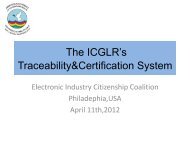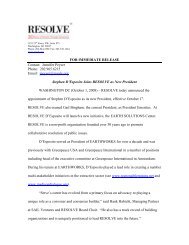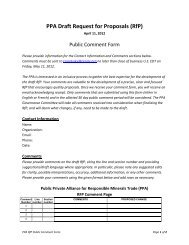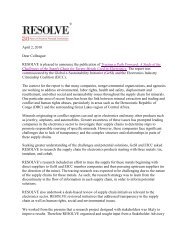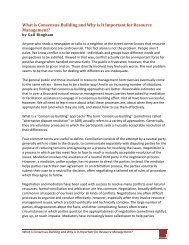Toward SuSTainabiliTy: The roleS and limiTaTionS of ... - Resolve
Toward SuSTainabiliTy: The roleS and limiTaTionS of ... - Resolve
Toward SuSTainabiliTy: The roleS and limiTaTionS of ... - Resolve
Create successful ePaper yourself
Turn your PDF publications into a flip-book with our unique Google optimized e-Paper software.
Chapter 2: Actors – Government 36Drivers <strong>of</strong> GovernmentInvolvementDifferent social science disciplines apply differenttheories to describe why institutions engage inpublic policy. For the purposes <strong>of</strong> this section,we simplify this thinking into three broad categories<strong>of</strong> drivers: (1) strategic or self-interest (itbenefits the government agency to participate)(2) values (participation is consistent with thevalues espoused by the agency <strong>and</strong> its staff) <strong>and</strong>(3) norms (the cultural pattern <strong>of</strong> behavior orexpectations supports certification) (Cashore,2002; Suchman, 1995).Strategic or Self-InterestGiven the increasing globalization <strong>of</strong> trade,the focus on free markets as solutions to society’sproblems, <strong>and</strong> the accompanying failure<strong>of</strong> governments to adopt “hard” regulations,some governments have embraced certificationschemes as a way to achieve public policy objectivesstrategically. Unable or unwilling to usetraditional comm<strong>and</strong>-<strong>and</strong>-control tools in the newglobal culture, agencies seem to embrace the path<strong>of</strong> least resistance springing up around them:private governance mechanisms. Certificationmight be a particularly attractive option becauseit requires verification by a third party, providinga compliance component that is normally part <strong>of</strong>government’s purview. Even when certificationsystems are public (that is, created by government)rather than private, they adopt the philosophy<strong>of</strong> private systems, namely, relying on voluntaryparticipation in response to market pressuresrather than the coercive power <strong>of</strong> government.<strong>The</strong> voluntary nature <strong>of</strong> certification schemes isconsistent with the idea <strong>of</strong> “captured” agencies,in which, because <strong>of</strong> political pressures, regulatoryagencies are considered more responsive tothe desires <strong>of</strong> the industries they are purportedto regulate than they are to their social welfaremission.According to Müller (2002), many policy makers<strong>and</strong> politicians around the world support certificationbecause they recognize it as less controversialthan other policy tools such as taxes or bindingregulations, <strong>and</strong> therefore easier to adopt. Manyalso believe that private certification may allowgreater flexibility for innovation than governmentscan provide, <strong>and</strong> they see certification as a selfsustainingsystem requiring few public resources.Developing countries with fewer resources (suchas expertise <strong>and</strong> funding) to develop robustregulatory regimes may find private certificationparticularly attractive as a way to open orretain markets in developed countries for theirown countries’ products. In short, many considercertification systems an option that allows governmentagencies to avoid controversy amongpowerful political players, be more effective, <strong>and</strong>spend less money—all outcomes that promotean agency’s self-interest.ValuesBut strategic drivers alone cannot fully explainthe emergence <strong>and</strong> promotion <strong>of</strong> certificationsystems (Bartley, 2007b; Bernstein & Cashore,2007). Not all agency action is based on industry“capture,” <strong>and</strong> environmental <strong>and</strong> socialissues inherently reflect values <strong>of</strong> some kind.Ideologies <strong>and</strong> approaches may differ, but at itscore the mission <strong>of</strong> environmental agencies isvalue-laden. <strong>The</strong> people who work for these agenciestypically share those values <strong>and</strong> promotegovernment efforts that advance them. Thosevalues may include conservation, public health,sustainability, international recognition, exp<strong>and</strong>ingmarkets, or economic development, amongothers. Regardless, agencies have missions, <strong>and</strong>certification schemes may help them fulfill thosemissions, particularly if politicians <strong>and</strong> industriesthwart traditional regulatory approaches or budgetsare limited. Carey <strong>and</strong> Guttenstein (2008)note that governments can find it easier to meettheir goals <strong>and</strong> adopt widely recognized internationalst<strong>and</strong>ards by drawing on the structureprovided by private schemes rather than trying tocreate requirements in-house.NormsMoreover, all institutions—perhaps democraticgovernments in particular—operate withina broad context <strong>of</strong> social values <strong>and</strong> norms<strong>Toward</strong> Sustainability: <strong>The</strong> Roles <strong>and</strong> Limitations <strong>of</strong> Certification



